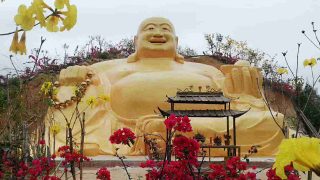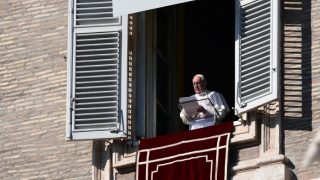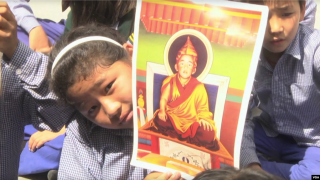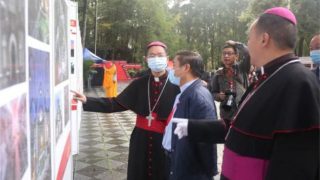The CCP continues to impose severe restrictions on religious practices of Tibetan Buddhists, destroying temples and eliminating traditional symbols across China.
by Lu Xiaojing
To prevent the spread of Tibetan Buddhism among Han Chinese, any display of religious practices is being suppressed by the communist regime—from harassing monks and destroying temples to controlling which lamas are allowed to reincarnate.
A newly built house razed to the ground
Since 2014, Tibetan Buddhists in Beihai, a prefecture-level city in the Guangxi Zhuang Autonomous Region, have been gathering to worship and chant in a hall, adorned with thousands of religious statues, that occupied two top floors of a new 4-story building. Built with over ten million RMB (about $ 1.4 million), donated by a local Buddhist, the building was also used to accommodate worshipers and visiting lamas from Tibet.
In mid-October last year, the county government dispatched over 300 personnel from the Public Security Bureau and other departments to demolish the building that was deemed “illegal.” A resident in the area told Bitter Winter that this was just an excuse the authorities used to demolish the building. “Three years ago, the local Ethnic and Religious Affairs Bureau issued a notice, ordering to crack down on Tibetan Buddhist venues in the locality,” he explained. “They demanded to clear out the Buddhist hall, paint over the words in Tibetan on the house’s exterior wall, and expel all lamas. Government personnel put up a slogan, calling to eliminate xie jiao, next to the house. The real reason for the demolition is that the government does not want monks to live here and promote Tibetan Buddhism.”
According to another resident, as five excavators were razing the building to the ground, officers with shields, electric batons, and iron bars were blocking all intersections nearby, preventing anyone from approaching the site.
Video 1: Excavators are demolishing the building that housed a Tibetan Buddhist hall (Video is provided by an insider)
Video 2: Many police officers guarded the site (Video is provided by an insider)
All the debris was immediately removed as soon as the last brick fell to the ground, and the house foundation was covered with soil, leaving no trace that the building ever existed.
Video 3: After the demolition, the house’s foundation was covered with soil (Video is provided by an insider)
Symbols of Tibetan Buddhism purged
Important symbols of Tibetan Buddhism installed in Chinese Buddhist temples, like stupas, commemorative monuments to keep relics related to Buddha, or prayer wheels, are also being demolished throughout the country.
The Sanzang Temple, built in the Tang dynasty (618-907) in Taiyuan city’s Yangqu county in the northern province of Shanxi, was listed as a major county-level historical and cultural site. In mid-November last year, government personnel raided the temple and confiscated Tibetan Buddhist scriptures and ceremonial scarfs, called Khatas.
A local Buddhist explained to Bitter Winter that the authorities ordered the crackdown because they don’t approve that people worship according to traditions of Tibetan Buddhism. “We can only worship the way the Religious Affairs Bureau prescribes,” he said. “People panic when faced with the government’s suppression of religions. We cannot chant in peace even inside the temple. This is so distressing.”
In the first half of 2019, government officials ordered the demolition of the stupa built in a Chinese Buddhist temple in Yichun, a prefecture-level city in the southeastern province of Jiangxi. They claimed that elements of Tibetan Buddhism are not allowed in Chinese Buddhist temples. To preserve the stupa, the temple’s in-charge hired workers to wrap the top of the monument and remove the prayer flags around it. Buddhist murals at the base of the stupa were painted over.
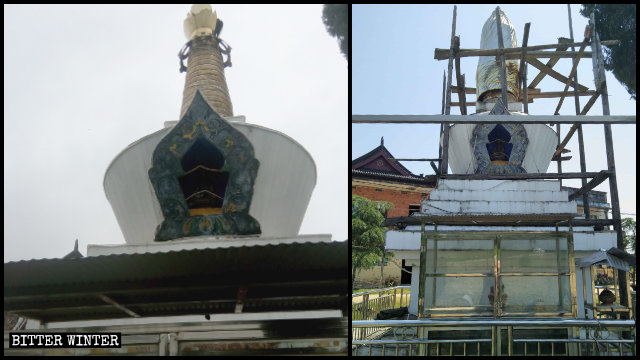
“Everyone’s religious beliefs are being suppressed, not to mention Tibetan Buddhists, under various pretexts,” a local Buddhist said helplessly. “We’ll be accused of anti-government activities if we try to protest or reason with authorities.”
Source: Bitter Winter
